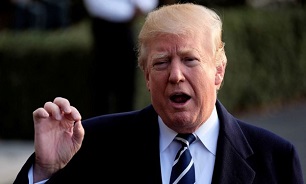US President Extends Russia Sanctions for Another Year
 In a letter required under the National Emergencies Act, Trump notified Congress that the White House will continue treating the situation in Ukraine as “an unusual and extraordinary threat to the national security and foreign policy of the United States”, as defined by Obama’s Executive Order 13660, dated March 6, 2014, RT reported.
In a letter required under the National Emergencies Act, Trump notified Congress that the White House will continue treating the situation in Ukraine as “an unusual and extraordinary threat to the national security and foreign policy of the United States”, as defined by Obama’s Executive Order 13660, dated March 6, 2014, RT reported.
The US has been gradually expanding the list of people and entities under its Russia sanctions over the years. The latest addition of 21 individuals and nine companies was announced in January 2016.
Trump's letter also noted that without a notification from the White House the sanctions would have automatically expired on the anniversary of the original executive order.
This is the second time this week that policy decisions made by the Trump administration were aimed at Russia. On Thursday, the State Department approved the sale of Javelin anti-tank missiles to Kiev, pending approval by Congress.
The original sanctions restricted travel of certain Russian individuals and officials to the US. The sanctions were later expanded to prohibit business dealings between any US persons and those individuals, as well as Russian financial services, energy, and defense industries.
Executive Order 13685, dated December 19, 2014, further expanded the sanctions to address the “Russian occupation of the Crimea region of Ukraine”, and prohibited any US persons, “wherever located”, from investing in Crimea. It also banned imports and exports of goods, services and technology to and from the region.
Following the Ukrainian coup in February 2014, Crimea held an independence referendum and asked to rejoin Russia, which it was separated from in 1954 by a decree from Soviet authorities. The reunion became official on March 18, 2014. However, Washington has accused Russia of “invading” Ukraine and illegally occupying Crimea.
Residents of several other regions refused to accept the new government. The Donetsk and Lugansk regions declared independence, but were not recognized by any sovereign state. In several other regions, Kiev crushed dissent by force. In May 2014, protesters in Odessa were attacked and herded into an office building, which was then set on fire. Around 40 people were killed. No one was ever prosecuted for the attack.
Relations between Washington and Moscow further deteriorated in 2016, when the Obama administration accused Russia of interfering in the US presidential elections and expelled a number of Russian diplomats. Moscow has denied all allegations.
